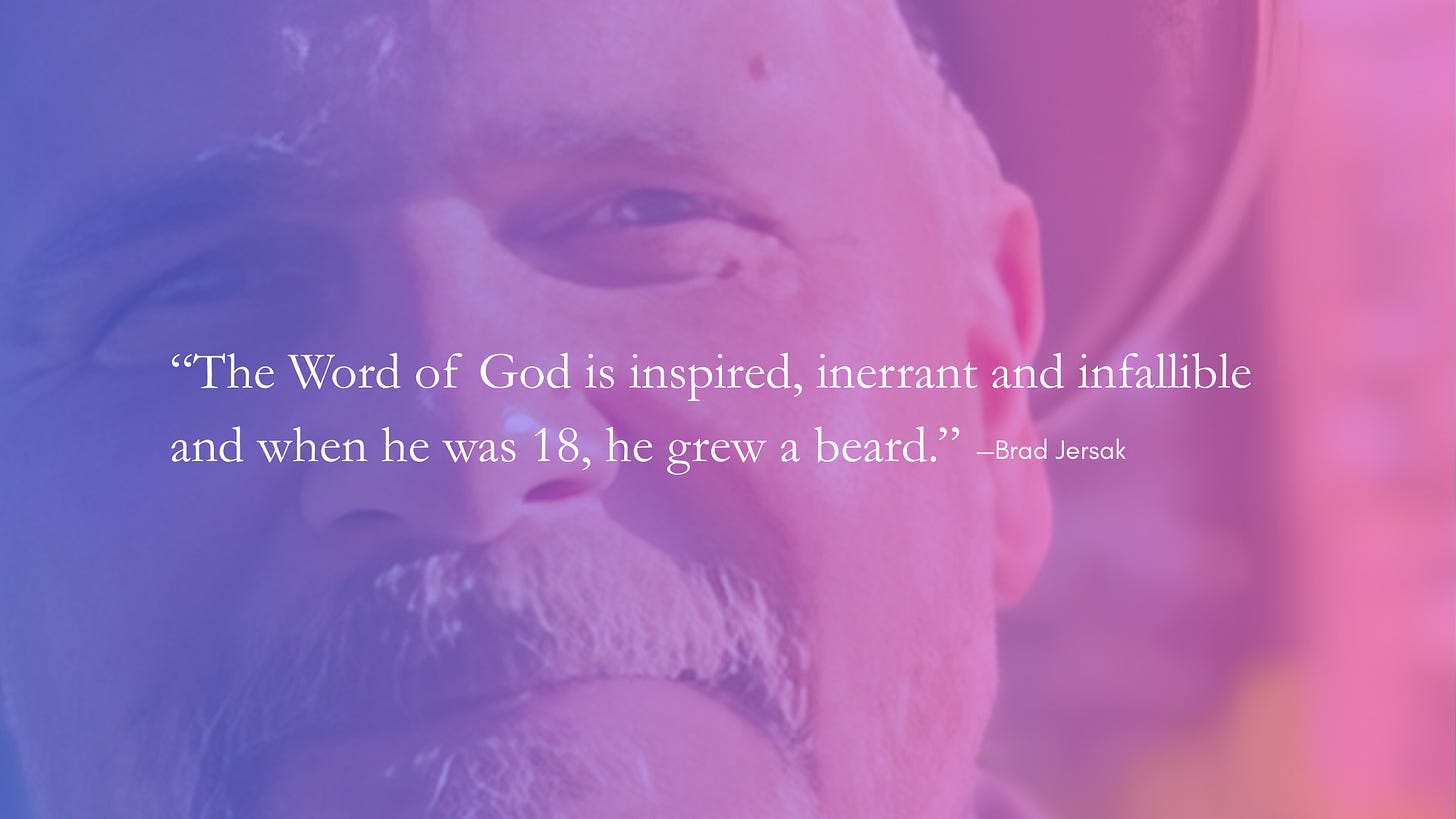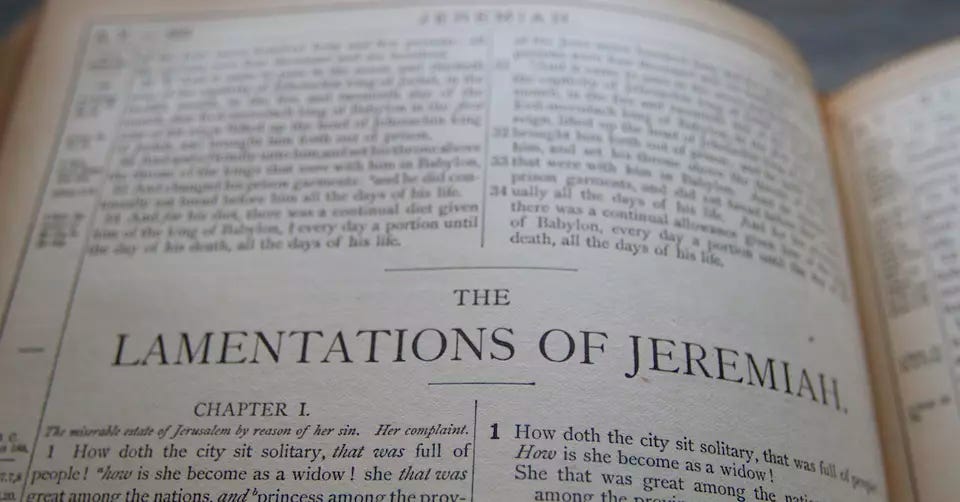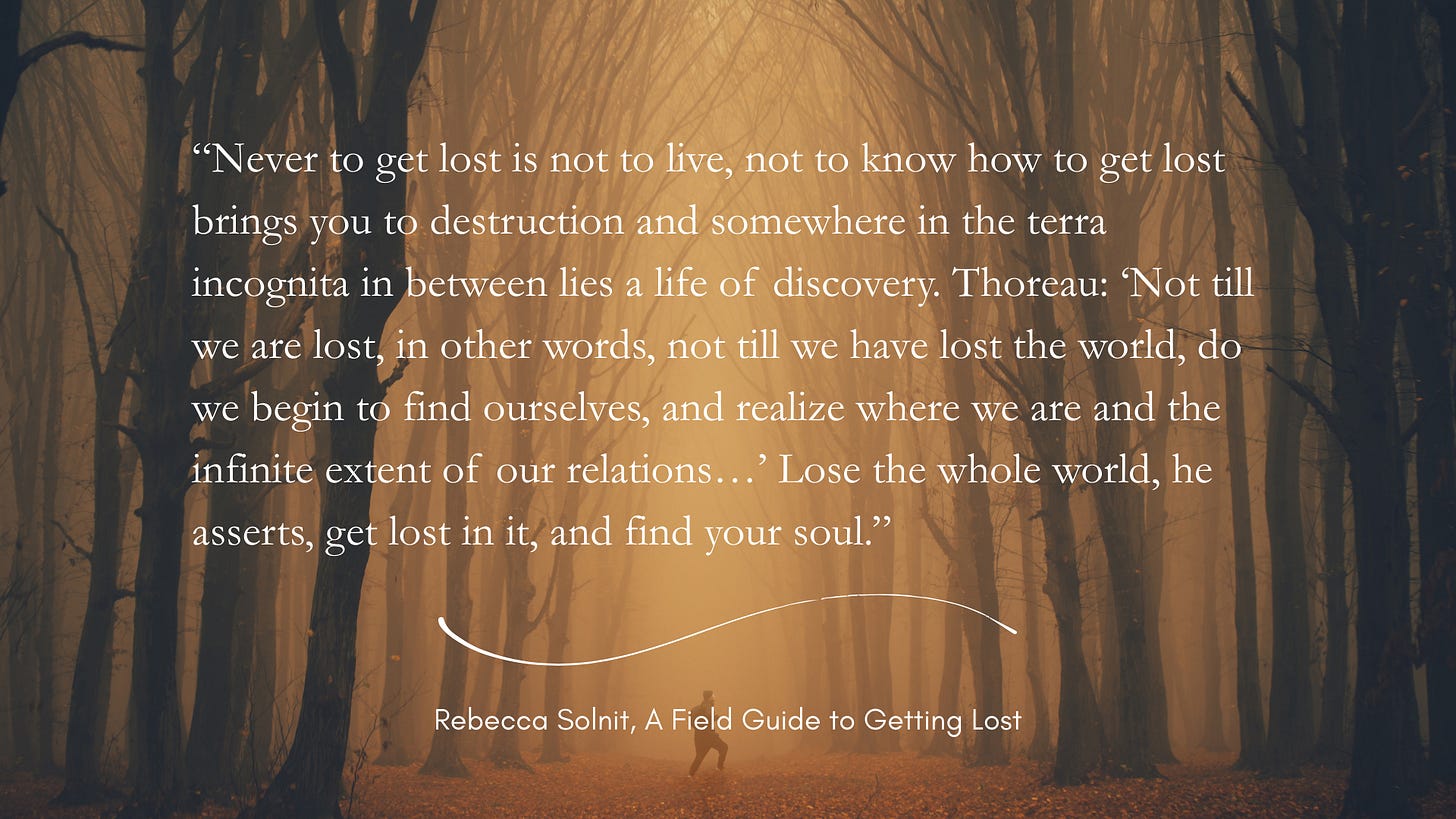How Do I Read the Bible? Climbing Out of the Dogma Box
in which I reflect on biblical inerrancy, biblical infallibility, and how I have evolved in reading the bible for and in my own faith practise
What is the Bible? How do we read the Bible? What do we think about the Bible? We hear words such as inerrant and infallible attributed to it. We hear the Bible described as the word of G-d.
We can argue about the degree of divinity of the biblical canon. We can insist that g-d wrote the Bible using human hands. We can disagree, pointing out the logical flaw in this assertion. The more we argue the more we sink into the quicksand of dogma. Eventually we have buried ourselves alive, in the sarcophagus of dogma. We often find ourselves stuck in a dogma box, when it comes to thinking about the Bible. We lose the plot when we decide to bicker about petty dogmatic details.
To a degree these things have importance. The questions provide a kind of structure for our practise and study. To a degree. Beyond that degree, they become a vehicle for self worship. Do you want to be right, or do you want to be in the light?
What spirit are you of?
How is your heart? Where is your heart? This matters most of all.
The state of your heart and the mood of your spirit will determine how you read the Bible. Do you see the story of the rich man and Lazarus as a device to threaten others with hell if they misbehave? Or do you see this story as a lesson to apply for yourself in your daily life with your connections to self and others? Do you see yourself in the biblical stories and psalms and songs, or do you see a cudgel you can use? There’s a difference. Can you see it?
Let me bring it back to the question of Bible itself. What is it?
We can overthink this stuff and get ourselves into a quagmire. We can say the Bible is the direct word of g-d as told to humans. This means the immutable g-d has written the Bible. The g-d of the Bible does not seem unchanging, He does not seem terribly compassionate—He seems fickle and vengeful. Okay. That’s problematic. How do we Christians reconcile the g-d of the Torah with the g-d incarnate of the New Testament? How do we reconcile the g-d of the sword and the plague with the g-d of the cross and resurrection? How do we reconcile the angry vengeful g-d who killed the entire cities of Sodom and Gomorrah, with the endlessly merciful g-d who welcomed to His supper table and repast the man who sold Him to His executioners? How do we reconcile the g-d who violently destroyed those who disobeyed, with the g-d who endured torture, beating, execution without self defense or retaliation — only love?
It’s a fool’s errand to try to match these two visions of g-d. This leads us to these weird dogmatic confabulations, such as penal substitutionary atonement, or dispensationalism, in which we make stuff up that sounds really smart and intellectual and high-falutin and that, at the same time, debases g-d—reducing salvation to a transaction. To what lengths do we go to insult g-d’s character, in our cleaving to the certitude of fundamentalism and literalism? Do we really need to become character assassins of g-d to make ourselves right? Why? Whom does this serve? Does it serve g-d to make him into an unharmonious tritheistic nightmare horror show? In our violent and savage nature do we try to make g-d in our image, rather than pause, reflect, and allow Him to make us in His image?
Spoiler. We actually have to let Him mould us into His image. We cannot do it on our own. Remember the creation myth? G-d fashioned us from the earth, blew His breath into our nostrils. G-d made us from this earth, formed us from the soil’s humus. I think this underscores the way in which He intended us to move through life.
Think about the humus of the soil — “decomposed, dark-coloured, carbon-rich matter”. Think about the composition of soil. Then consider the notion that g-d fashioned us from that. Britannica defines soil as “the biologically active, porous medium that has developed in the uppermost layer of Earth’s crust. Soil is one of the principal substrata of life on Earth, serving as a reservoir of water and nutrients, as a medium for the filtration and breakdown of injurious wastes, and as a participant in the cycling of carbon and other elements through the global ecosystem. It has evolved through weathering processes driven by biological, climatic, geologic, and topographic influences.”
If g-d formed us from a substrate of the earth that’s itself made up of decomposed matter, surely that’s a symbol of how He refines our spirit throughout this life? Think about that. Lamentations says, “His mercies are made new each day”.
So, the answer to the question what spirit are you of largely determines how you see and read the Bible. Inerrant? Human religious library? What if Divine inspiration never ended? What if it continues? What if the answer to what is the Bible lies somewhere between inerrancy and human catalogue of g-d? What if, like the nature of g-d’s being, we cannot fully penetrate the deep mysteries of and about the Bible with our carnal intellect? What if the certitude we seek through our righteousness and what if our indignation about that righteousness comes from egoism, ie. self-worship?
So, how do we read the Bible? I will answer this question here for myself, I cannot prescribe anything for anyone, only share what I’ve learned through my experience. You must choose your path, that’s what Free Will means.
The question then becomes —how do I read the Bible?
Well, let me answer that question by telling you how I don’t read the Bible. I don’t read the Bible to learn how to judge others with a Biblical accent. I don’t read the Bible to learn how to use it as a cudgel to browbeat others. I don’t read the Bible to learn how to justify depravity, suffering, injustice, mass carnage, or any other wickedness. I read it to learn about how I can be a better human, in the way g-d made me—in His image. I don’t read the Bible to affirm my ideological views about religious institutions or about g-d Himself. I don’t read the Bible to build a dogmatic or doctrinal arsenal with which I can slay others. That sh1t poisons the soul.
The religion of my childhood, Catholicism, didn’t involve Bible study and expounded notions of Biblical truths, as evangelicals express and understand them. My religious upbringing exposed me to mystics, monastics, missionaries, and deeply humble and Christ-like people. Services to others figured prominently. My father served as a lay preacher, leading a weekly Bible meeting for many years. For me, the Bible has always served as a wild and powerful and mysterious and far reaching story of g-d, as seen through the lens of various humans with specific political and cultural and social contexts.
In my childhood religious culture, the New Testament—specifically the Gospels—provided the focal point of my learning about g-d, through the story of Jesus and His apostles. The Hebrew Bible, called Old Testament in Christian circles, got relegated to the sidelines. Things like imprimatur and nihil obstat featured fairly prominently in the biblical and religious books we read and studied. I find sectarianism annoying at this point in my journey—it’s people wanting to put me in one of their identity boxes. It’s people wanting to know how they should treat me, based on the Christian sect they assign to me. It’s a distraction. It’s political theatre masquerading as piety. It’s telling me what I’m allowed to think and perceive, lest I tread into heresy or thought crimes. I reject that egoistic game—I’m still not joining your cult.
I found Jesus only because I lost sight of Him completely.
In fact, to a large degree I lost faith for a block of time. I went through a period of disconnect in which I couldn’t pray. I felt lost in a void. Rebecca Solnit wrote a whole book, A Field Guide to Getting Lost, about the birth of discovery from the experience of getting lost. When we acknowledge our ignorance and ineptitude, and embrace our teachability, our willingness to live inside the uncertainty of the world and humanity and the heavens and g-d, then we open ourselves to finding the hidden treasure we didn’t even know existed. G-d eludes us, He defies our crude attempts to capture Him and place Him in the certitude box. So too, with the Bible.
An explanation of Lot’s wife on a Chabad website many years ago opened my heart and mind to seeing the familiar Bible with fresh eyes. Lot’s wife turned into a pillar of salt when she disobeyed the command not to turn around to look at the destruction of Sodom. Profound in its simplicity, isn’t it? After seeing that, I would, throughout the years, frequently consult Judaism on a biblical or Divine question. It felt like the spiritual equivalent of running to my mother with a problem, which I did constantly until her illness and death.
A few years ago, when I gingerly dipped my toe back into the g-d waters, I did so with a Jewish teacher. Then I expanded my learning through consulting selected rabbinical teachings, from select rabbis. In fact, my greatest understanding of the story of g-d has come from learning the Torah— it has come from studying the Torah on its own terms. Think of it as framing a house in the building process. Or perhaps like pouring the foundation on which to erect the framework to build the house. These things, framework and foundation, form parts of the structure of the abode. We need them to build a home, they themselves do not suffice as the home. Somewhere in the messy awful books of Numbers and Leviticus, amid the detailed descriptions of blood sacrifice, I saw the missing piece that led me back to Jesus.
I only came to see and feel and understand Jesus in my heart when He wasn’t there in the scriptures I studied. Read that again.
Maybe that’s the shepherd coming to reclaim His sheep—me?
Note. I continue to study with that Jewish teacher, I continue to take in Rabbi Fohrman lessons on Torah. With the knowledge that, for me, it’s framework — not enough to live inside, because Jesus is missing from it. Knowing Jesus doesn’t negate my search for the treasures of the Hebrew Biblical canon. It’s not a mutual exclusivity game for me. Remember, Judaism precedes Jesus—He learned many of these things Judaism teaches.
That said, I’ll explain my transformation as follows.
I had to go away on a journey and get a little lost, in order to find myself in Jesus. I put my baggage down, and entered the process of learning with a humble and contrite heart. I committed to learning the Torah without the Christian projections, without the various prescribed Christian interpretations imposed onto the text. Jews don’t need me to join their club, in fact they discourage conversion, and that made it a safe environment within which to learn. Often I felt like the dumbest person in the room, soaking it all in, then taking time to reflect on and assimilate what I had taken in. I have nearly completed the Torah cycle, I’m working through Deuteronomy now. When I read and study the parshas I think about the fact that Jesus did this too, He studied at length with rabbinical teachers and sages of His time—long before He went out and preached to and taught and healed others. Jesus studied for His missionary work.
Studying the Torah has helped me understand what felt murky and unclear before. I do see a Divine thread throughout the scriptures, both old and new. I think, as Brad Jersak has said and written, the answer about the Bible lies in between the polar opposites of Biblical inerrancy and human catalogue of g-d. The more the fundamentalists press me to accept inerrancy the more I feel inclined to veer toward human catalogue. G-d gave me Free Will and yet humans have much trouble doing the same!
I do not believe in the Bible as a horcrux of g-d. I do not think of the Bible as an object where g-d has stored His Spirit for keeping of some kind. I do not see it as a book I must take literally. I think the Spirit infuses me—a human made in g-d’s image—as I read the scriptures. I think my Free Will determines whether I accept the Holy Spirit, or refuse it entry into my heart. I think this mercy happens anew, every day.
I think the question of what Spirit am I of must precede the question how do I read the Bible. The question of how do I want to serve g-d must precede the question of what is the Bible. I am a dynamic entity, (not static), and I think that the Spirit moves me and moves within me, and so my perception might change from season to season of my life.
So, now I’ve begun a new season of engaging the Bible by deep-diving into the New Testament. I’ve read the gospel of Matthew and my church has spent this year preaching from Matthew each Sunday. I read the gospel to learn about the person of Jesus. I can recognise many teachings He delivers and see the way He has turned Jewish Mishnah on its head, giving it His own spin. Refusing to remain in any dogma box when it comes to G-d, Christ, and the Bible enables me to walk my path faithfully and with a humble heart.
I don’t need to be right, I need to be in the light.







> "At least 18,000 different gods, goddesses and various animals or objects have been worshipped by humans."
https://www.psychologytoday.com/us/blog/your-brain-food/202107/why-do-humans-keep-inventing-gods-worship
Though, as someone pointed out in a Quora question on the topic, don't worry, only yours is the True One ... 😉🙂
But notwithstanding Pierre Laplace's argument to the contrary -- "I have no need of that hypothesis", i.e., god -- there is still merit in the concept, at least as long as people recognize that it IS such a hypothesis, something of a work in progress.
Somewhat apropos of which, you might be "amused" by this quote of the Dalai Lama in this old (1995) article by anthropologist/anesthesiologist John Hartung on "Love Thy Neighbor: The Evolution of In-Group Morality". Originally on his website, then in Skeptic magazine and now on ResearchGate:
JH: "And according to the New York Times, when thousands of the world’s clerical leaders gathered at the second World Parliament of Religions held in Chicago one hundred years after the first such gathering in 1893, 'Evangelical and fundamentalist Christian churches that are embraced by many Americans shunned the gathering on theological grounds, and the established centrist and liberal denominations, like the Episcopalians and Methodists that have usually supported interfaith talks, were scarcely visible.'
Eastern Orthodox Christians came but left en masse when they found themselves in the company of 'neopagans,' and Jewish groups withdrew when the Nation of Islam showed up. Sikhs and Hindus stayed but tried to push each other out of the convention center (physically), and the Dalai Lama astutely concluded 'Nonsense!' in response to his own question: 'If we have conflicts in the name of religion, can we help resolve other problems?' ..."
https://en.wikipedia.org/wiki/John_Hartung
https://www.researchgate.net/publication/216842386_Love_Thy_Neighbor_The_Evolution_of_In-Group_Morality